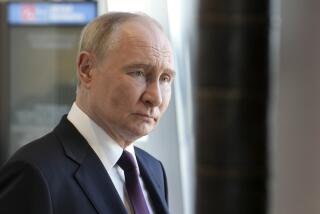Gird for Hard Year, Yeltsin Warns Russia
- Share via
MOSCOW — Russian President Boris N. Yeltsin told the nation Sunday evening that the coming year will be a hard one as he implements radical economic reforms, starting with an end to state subsidies for consumer goods and consequent threefold price increases this week.
“Russia is seriously sick,” Yeltsin said, and it will require tough measures to cure all its ills.
Russia’s radical measures are encountering opposition, however, from some of the other republics, including Ukraine, that have joined the Commonwealth of Independent States. And Yeltsin is likely to face considerable criticism for his Russia-first approach today when their presidents meet in Minsk, the capital of Belarus.
Gennady E. Burbulis, Russia’s first deputy prime minister, said the Minsk summit needs to resolve a number of basic issues on the coordination of economic policy if the reforms are to proceed at a fast pace. “Lying ahead is work that brooks no delay, but which at the same time cannot be accelerated,” he said.
Also on the Minsk agenda are agreements on the control of the nuclear arms inherited from the Soviet Union and the management of the commonwealth’s other military forces.
Although Ukraine, Azerbaijan and Moldova are planning to create their own armies and might refuse to sign the accords, Yeltsin said on Sunday that he expects the presidents to agree “on unified armed forces, their structures and coordination and a unified command over strategic nuclear weapons,” the Tass news agency reported.
In his address, Yeltsin warned Russians that patience will be needed so that the country is not torn by violence or civil discontent as prices soar, unemployment spreads and government spending is cut. “During that period we need restraint,” he said. “In no way can we permit explosions or panic.”
But he promised that results will be evident in six to eight months and that life will then begin to improve. “The most important thing is not to sit on our hands, to suffer and wait for better times,” he said. “That way, you won’t change anything.”
In his somber review of last year and appraisal of the next, Yeltsin was clearly seeking to prepare the nation for the price increases coming Thursday. Although they have been debated literally for years, the measures have been put off each time for fear of their impact; now, in the wake of the collapse of the Soviet Union, Yeltsin is prepared to proceed.
“On Jan. 2, probably the most painful and unpopular measure, which the leaders of the country did not dare to take, will begin--the freeing of prices,” Yeltsin said. “It is a forced, temporary measure. We have been looking for the most acceptable, the easiest version of reform for the past two months. And we came to understand--there is no other way.”
Televised on Sunday evening, the address was his first to the country since Soviet President Mikhail S. Gorbachev resigned last week, bringing to an end the Soviet era, and Yeltsin sought to give Russia’s 150 million people an idea where he would lead them.
“Life is now hard for all of us,” the Russian president said. “Our citizens are at times overwhelmed by a sense of bitterness toward their country. But it is unfair to speak about Russia only in gloomy, deprecatory tones. It is not Russia that has suffered a defeat, but the Communist idea, the experiment to which Russia has been subjected.”
But Russia’s “inheritance” after 74 years of socialism is a staggering number of problems, Yeltsin said, and years, if not decades, will be needed to recover.
“It became clear long ago that it was simply impossible to leave things as they were,” he said. “Unfortunately, the solution of this problem took too long. There was much resistance, and the people were striving for freedom.”
With the dissolution of the Soviet Union and the collapse of socialism, “Russia got back from the Union its economy, its property, which had been taken away in 1917,” Yeltsin said, referring to the Bolshevik Revolution that brought the Communist Party to power. “The legacy we received is simply depressing--it’s as though an enemy had occupied and managed our land.”
The huge Soviet foreign debt, estimated at more than $80 billion, which Russia and the other republics now must pay, had been almost totally wasted, he said, and the money borrowed had simply “sunk into the sand” with no benefit to the country.
He pledged to push ahead with rapid privatization of state-owned businesses and land, promising that at least half of all light industry, food processing, construction, production of construction materials, retail trade, restaurants and services businesses would be in private hands by the end of next year.
But privatization will not be extended to the energy, transportation and communications sectors, to oil, coal and gas reserves or to forests or water supplies.
Major changes will be made in agriculture, he said, with an end to all subsidies to state and collective farms, and assistance, such as technical advice, fertilizers and credits, will be given instead to private farmers.
“I think the time has come to fully recognize private ownership of land, including the right to buy and sell it,” Yeltsin said.
Social spending will be controlled more tightly, he said, to make sure it reaches the people really in need, but health, education and cultural spending will not be cut.
In confirming his intention to proceed with the price increases--actually an end to government subsidies and then freeing prices from state controls to cover production costs and respond to market pressures--Yeltsin said that special measures will be taken to help low-income families. “By all means, we will protect the needy,” he said.
More to Read
Sign up for Essential California
The most important California stories and recommendations in your inbox every morning.
You may occasionally receive promotional content from the Los Angeles Times.












